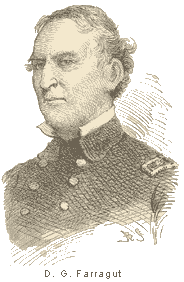David Glasgow Farragut was born near Knoxville, Tennessee, and entered the United States Navy at the age of nine, not an unusual occurrence in that era. He served under David Porter on the Essex where the two established a lasting relationship. Farragut saw service in the War of 1812 and was captured briefly by the British.
 Farragut’s career followed traditional lines during peacetime in the 1820s and 1830s. During the Mexican War (1846-48) he was assigned blockade duty at enemy ports. In 1854, he established the Mare Island Navy Yards at San Francisco and remained there as commandant until 1858. In 1855, he was promoted to captain.
At the outbreak of the Civil War, Farragut immediately announced his loyalty to the Union and moved his home from Norfolk to Hastings-on-Hudson, New York. Initially he was confined to desk duty since some of his superiors had doubts about his loyalty. However, in 1862 he was assigned the task of maintaining a blockade in the eastern portion of the Gulf of Mexico and, eventually, capturing New Orleans.
In April 1862, Farragut’s fleet of approximately 50 ships and 200 cannon opened fire on two Mississippi River forts south of New Orleans. The bombardment failed to force surrender, so Farragut opted to sail his fleet past those points. Only three vessels were lost. He next defeated a small Confederate flotilla, which opened the way to New Orleans. The city surrendered on April 25, 1862, and was occupied by Union soldiers a few days later. Farragut received formal recognition from Congress for his contribution and was promoted to rear admiral.
Later in 1862, Farragut participated in the unsuccessful attempts to take Port Hudson and Vicksburg. The following year, he played a vital role in U.S. Grant’s victories in that area. Later in 1863, Farragut returned to New York for repairs to his flagship, the Hartford.
During the summer of 1864, in the most important naval action of the Civil War, Farragut managed to seal off Mobile Bay, the site of major blockade-running activities.
Farragut retired from service on account of ill health in late 1864. He had become a national hero and was promoted to vice admiral and later admiral.
Farragut’s career followed traditional lines during peacetime in the 1820s and 1830s. During the Mexican War (1846-48) he was assigned blockade duty at enemy ports. In 1854, he established the Mare Island Navy Yards at San Francisco and remained there as commandant until 1858. In 1855, he was promoted to captain.
At the outbreak of the Civil War, Farragut immediately announced his loyalty to the Union and moved his home from Norfolk to Hastings-on-Hudson, New York. Initially he was confined to desk duty since some of his superiors had doubts about his loyalty. However, in 1862 he was assigned the task of maintaining a blockade in the eastern portion of the Gulf of Mexico and, eventually, capturing New Orleans.
In April 1862, Farragut’s fleet of approximately 50 ships and 200 cannon opened fire on two Mississippi River forts south of New Orleans. The bombardment failed to force surrender, so Farragut opted to sail his fleet past those points. Only three vessels were lost. He next defeated a small Confederate flotilla, which opened the way to New Orleans. The city surrendered on April 25, 1862, and was occupied by Union soldiers a few days later. Farragut received formal recognition from Congress for his contribution and was promoted to rear admiral.
Later in 1862, Farragut participated in the unsuccessful attempts to take Port Hudson and Vicksburg. The following year, he played a vital role in U.S. Grant’s victories in that area. Later in 1863, Farragut returned to New York for repairs to his flagship, the Hartford.
During the summer of 1864, in the most important naval action of the Civil War, Farragut managed to seal off Mobile Bay, the site of major blockade-running activities.
Farragut retired from service on account of ill health in late 1864. He had become a national hero and was promoted to vice admiral and later admiral.